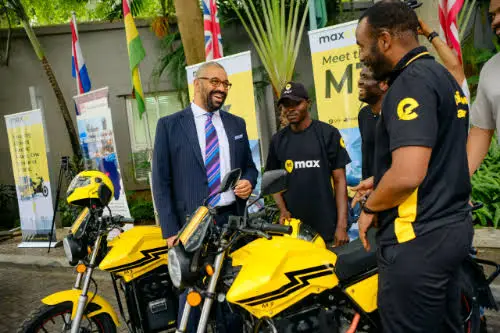MAX, a Nigerian electric vehicle (EV) startup, has launched West Africa’s first solar-powered battery swap station, a bold step to transform e-mobility in the region. This station is designed to support EV riders, especially gig workers, offering clean, reliable power around the clock and lowering dependence on costly and polluting fossil fuels.
Solar-powered battery swapping brings 24/7 clean energy to riders
In Nigeria, MAX’s new battery swap station operates with a 20kWp solar photovoltaic array, a 24kW inverter, and a 30kWh battery bank. During the day, solar panels power the swapping units directly and store excess energy to guarantee uninterrupted service even at night or during cloudy weather.
This reliable energy source is crucial for riders who rely on quick, efficient swaps to keep their operations moving without downtime. MAX says this innovation “eases two of the biggest burdens on African riders, soaring fuel costs and time spent waiting”.
“This isn’t just an energy solution; it’s a statement,” said Chinedu Azodoh, co-founder and president of MAX. “We’re proving that Africa’s future can be built on clean, resilient infrastructure that serves both people and the planet.”
MAX positions this solar swap station as part of a larger plan to support Africa’s transition to cleaner, affordable transportation. Electric motorcycles powered this way cost about half as much as gas engines, thanks to lower maintenance and energy expenses. Access to swap stations on key routes means drivers can rapidly return on the road with a fresh battery, cutting delays and improving daily earnings.
Charging infrastructure that supports growth and convenience
MAX’s battery swap infrastructure goes beyond powering vehicles; it integrates innovative technologies like remote battery-health tracking and flexible digital payments to provide drivers added convenience. The swap stations enable gig economy workers to avoid the unpredictability of fuel price hikes and the noise and pollution of gasoline motorcycles. MAX’s leadership claims their model is “setting a new benchmark in blending mobility and sustainability” across West Africa.
With forecasted sales of 62 million new motorcycles in Africa by 2030, and 70per cent used as commercial taxis, MAX’s solar-powered swap station directly addresses the urgent need for greener, cost-effective urban transport options. This initiative places Nigeria at the forefront of clean mobility adoption in the region while empowering drivers with reliable, eco-friendly energy sources.
With this station, we’re not just powering bikes—we’re powering possibilities,” said Adetayo Bamiduro, MAX’s CEO and co-founder. “Every electric ride means lower costs for Champions, cleaner air for our cities, and a future where energy is local, reliable, and green.”
The launch of this solar-powered battery swap station marks a clear milestone in the effort to make electric vehicles practical and accessible across West Africa’s demanding urban and peri-urban environments.












